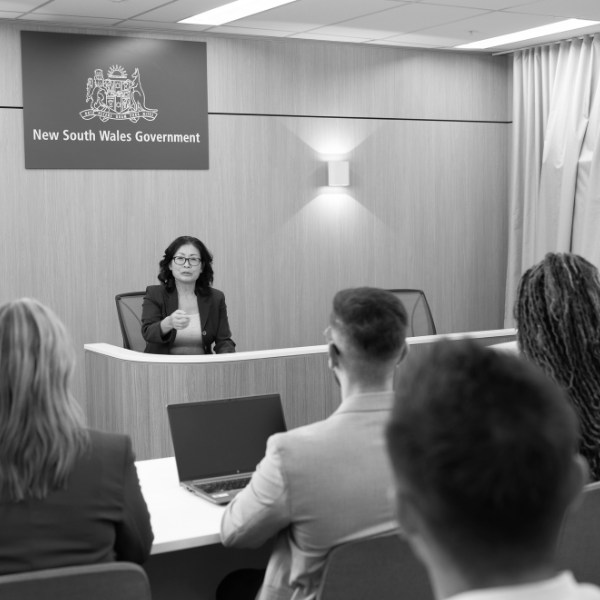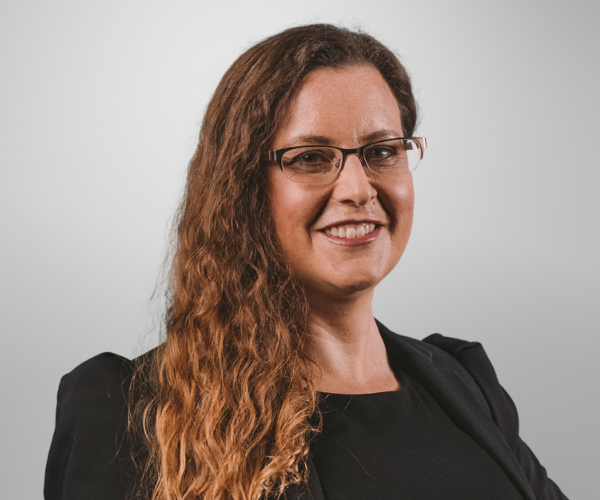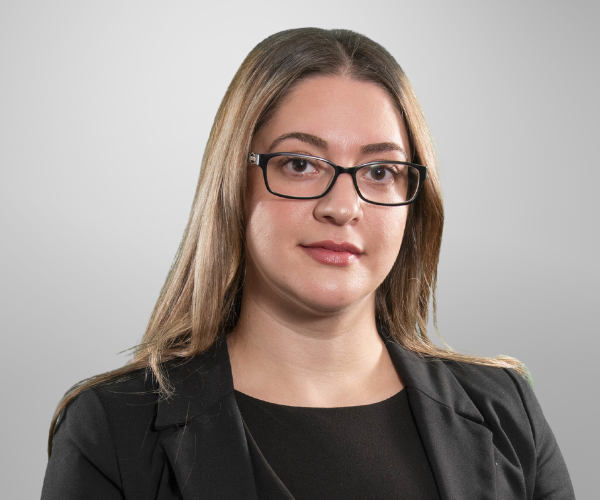GO FROM STUDYING TO PRACTISING LAW
Just when you thought you were done with study, you now have Practical Legal Training (PLT). But here’s the thing - PLT is hands-on learning that takes you out of textbooks and into the driver’s seat, so that you can get to where’s next in your legal career.
Choose when and how you want to learn, connect with pros and peers and turn our network into yours.
WHAT'S CHANGING IN NSW
The NSW PLT course is changing from 1 March 2026, following new requirements set by the Legal Profession Admission Board (LPAB). Here's what's different - and what it means for you.
YOUR A-Z GUIDE TO THE INS AND OUTS OF PLT
Get the full picture of Practical Legal Training—all in one place.
This guide covers structure, subjects, fees, work experience, and everything else you need to know to get started.
What you'll get:
- Course structure and subjects
- Study modes and attendance
- Locations
- Work experience options
- Fees and enrolment info
3 Pillars of PLT
WHAT'S CHANGING IN NSW
The NSW PLT course is changing from 1 March 2026, following new requirements set by the Legal Profession Admission Board (LPAB). Here's what's different - and what it means for you.
YOUR COURSE OPTIONS
ALL
Available nationwide, with flexible online and on-campus options — and new NSW course formats from 1 March 2026.
Full-Time
Australia-wide.
NSW until 1 March 2026
15 weeks
30-35 hrs study per week
5 days
Domestic $9,200 / International $13,270
Balanced
Victoria & Queensland.
NSW until 1 March 2026.
18 weeks
15-20 hrs study per week
10 days
Domestic $9,200 / International $13,270
Part-Time
Australia-wide.
NSW until 1 March 2026.
15 weeks
15-20 hrs study per week
5 days or 12 evenings
Domestic $9,200 / International $13,270
3 Weeks On-Campus
From 1 March 2026 (NSW only)
15 weeks
15-20 hrs study per week
3 weeks
Domestic $9,200 / International $13,270
2 Weeks & 5 Days On-Campus
From 1 March 2026 (NSW only)
15 weeks
15-20 hrs study per week
2 weeks and 5 days (Mon, Wed or Fri)
Domestic $9,200 / International $13,270
1 Week & 10 Days On-Campus
From 1 March 2026 (NSW only)
15 weeks
15-20 hrs study per week
1 week & 10 days (Mon, Wed or Fri)
Domestic $9,200 / International $13,270
Weekly On-Campus
From 1 March 2026 (NSW only)
15 weeks
30-35 hrs study per week
5 days week one & 3 days every following week
Domestic $9,200 / International $13,270
Attendance Exemption
From 1 March 2026 (NSW only)
Eligibility rules apply
30 weeks
15-20 hrs study per week
5 days only
Domestic $9,200 / International $13,270
START BEFORE 1 MARCH 2026
Prefer the current structure? Start before 1 March 2026 and complete PLT with 5 days' on-campus workshops and 75 days of work experience.
Full-Time
Before 1 March 2026
15 weeks
30-35 hrs study per week
5 days on-campus
Domestic $9,200 / International $13,270
Balanced
Before 1 March 2026
18 weeks
15-20 hrs study per week
10 days on-campus
Domestic $9,200 / International $13,270
Part-Time
Before 1 March 2026
30 weeks
15-20 hrs study per week
5 days on-campus
Domestic $9,200 / International $13,270
START AFTER 1 MARCH 2026
Planning to start your PLT in March 2026 or beyond? You’ll be part of the new course structure with 15 days' on-campus workshops and 15 days of work experience.
3 Weeks On-Campus
From 1 March 2026
15 weeks
15-20 hrs study per week
3 weeks on-campus
Domestic $9,200 / International $13,270
2 Weeks & 5 Days On-Campus
From 1 March 2026
15 weeks
15-20 hrs study per week
2 weeks and 5 days (Mon, Wed or Fri) on-campus
Domestic $9,200 / International $13,270
1 Week & 10 Days On-Campus
From 1 March 2026
15 weeks
15-20 hrs study per week
1 week & 10 days (Mon, Fri or Wed) on-campus
Domestic $9,200 / International $13,270
Weekly On-Campus (CRICOS approved)
From 1 March 2026
15 weeks
30-35 hrs study per week
5 days week one & 3 days every following week on-campus
Domestic $9,200 / International $13,270
Attendance Exemption*
From 1 March 2026
*Eligibility rules apply
30 weeks
15-20 hrs study per week
5 days online
Domestic $9,200 / International $13,270
VIC, QLD, WA, SA, ACT & NT
No matter where you are in Australia, you can start your PLT with flexible, practical courses designed to fit around your life.
Full-Time
Australia-wide
15 weeks
30-35 hrs study per week
5 days
Domestic $9,200 / International $13,270
Balanced
Victoria & Queensland
18 weeks
15-20 hrs study per week
5 days
Domestic $9,200 / International $13,270
Part-Time
Australia-wide
30 weeks
15-20 hrs study per week
5 days
Domestic $9,200 / International $13,270
MEET YOUR SUPPORT TEAM
Your PLT support team is made up of experienced lawyers who’ve walked the walk before.
Their feedback to you will be personalised and practical. With so much one-on-one guidance at the ready, you’ll be thriving in no time.
WHAT'S CHANGING IN NSW
The NSW PLT course is changing from 1 March 2026, following new requirements set by the Legal Profession Admission Board (LPAB). Here's what's different - and what it means for you.
YOUR COMPLETE OVERVIEW
COURSEWORK
Whether you’re conducting client interviews, preparing a Statement of Claim or drafting legal submissions, you’ll learn by doing – not reading – throughout your PLT.
At the College of Law, that means no formal exams or academic essays to worry about. Just hands-on tasks and activities to prepare you for the realities of legal practice.
WHAT (AND HOW) YOU'LL LEARN IN YOUR PLT
Your PLT training will begin with five days of live workshops (online or on campus). From negotiation to advocacy, this is where you’ll start building real-world skills.
After your live workshops, you’ll move to our engaging online Learning Portal. You’ll progress through your remaining compulsory subjects before exploring your two electives.
Meanwhile, you’ll chat with your classmates. Put theory to the test in engaging tasks. And get one-on-one feedback from your facilitator.
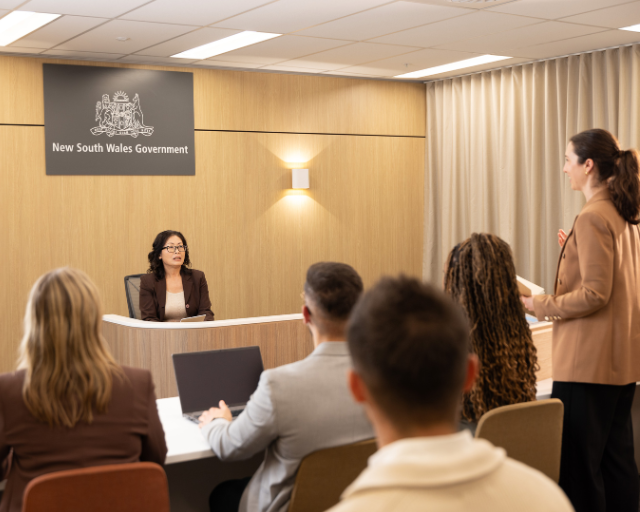
LIVE WORKSHOPS
From negotiation to advocacy, this is where you’ll start building real-world skills.
You’ll also gain tips and insights from qualified instructors to prepare you for the day-to-day demands (and rewards) of working in a legal practice.
Whether you participate online or on campus, these workshops are highly interactive, with many opportunities to engage with your facilitator and classmates.

Virtual practice
Instead of sitting in lectures and taking exams like you did in university, you’ll learn by doing in the Virtual Practice segment – completing real-world tasks that simulate legal practice.
You can expect to submit 2-3 tasks (full-time) or 1-2 tasks (part-time) each week.
Your facilitator will provide feedback as you go, so you can feel confident you’re ready to bring your new skills to work.
And these tasks aren’t graded, so you won’t need to worry about ‘getting it wrong’. The PLT isn’t about acing exams. It’s about practising, making mistakes, learning from them – and building your legal toolkit in the process.

Huddles
You’ll have the option to join a regular online group coaching session to help you stay on track. These 30-minute sessions are your time to ask questions, get support from your facilitator and classmates and work through any issues that come up.

Progress quizzes
At the end of each subject, you’ll sit a progress quiz. This will help you gauge where you’re at in your understanding of key concepts.
To successfully complete the quiz, you’ll need to score at least 50%. If you don’t manage it on your first try, don’t worry. You can retake the quiz as many times as you need to, improving your score with each try.
The progress quiz isn’t about achieving top grades. It’s about boosting your confidence and showing yourself how well you’ve grasped your new skills.

Practice ready review
There are no exams in the workplace, and there won’t be any in your PLT. Instead, once you finish your tasks in each subject, you’ll go through a practice ready review with a lawyer who will act as your supervisor.
This process is designed to feel like real-life work, preparing you to handle tasks in the workplace. It’s similar to the conversations between a junior lawyer and their supervising lawyer. And don’t worry, it’s always open book.
During the 45-minute conversation, your supervisor will ask questions about your tasks, wanting to know how you reached your conclusions and encouraging you to explain your reasoning.
On satisfactorily completing the review, you’ll move on to your next subject.
COMPULSORY SUBJECTS
You will complete seven subjects as part of your PLT coursework: five compulsory and two electives. They may look similar to the subjects in your law degree, but they focus on the practice of law rather than substantive law.
Effective lawyers require extensive technical legal expertise and excellence in a range of professional and interpersonal skills, from negotiating to managing workload.
As part of this subject, you will learn:
- Communicating effectively
- Interviewing clients
- Writing and drafting
- Negotiation and early dispute resolution
- Representing clients in court
- Problem solving
- Managing risks for clients
- Managing time and workload, and
- Maintaining wellbeing in practice.
You will complete interactive workshops facilitated by experienced lawyers in which you will have the opportunity to role play interviews, negotiation and courtroom appearances. You will learn how to approach client problems, draft written communications and documents, manage risk, and work effectively in your legal workplace. You will have opportunities to apply and practise these skills throughout the course.
No matter where or how you practise law, this subject is relevant and important to you, your clients and the community. You will further your understanding of the role of the legal profession in the legal system, in particular, its responsibility to serve the community successfully.
Beyond mere knowledge of the rules regulating the profession, you will develop the skills to identify and respond appropriately to ethical dilemmas:
- Strategies and techniques to help to reduce the prospect of a disciplinary complaint being brought against you
- How to respond professionally if a complaint is made
- The confidence to voice ethical concerns in practice
- How to maintain trust and general account records according to law and good practice.
Civil litigation is a process of resolving disputes between parties, including:
- Any interactions between disputing parties prior to proceedings being commenced, such as letters of demand
- The initiation and defence of proceedings in courts or other tribunals
- Pre-trial procedures such as interlocutory applications
- Court and tribunal appearances
- Alternative avenues of dispute resolution such as negotiation, mediation and arbitration
- Post-trial procedures such as costs recovery and the enforcement of judgments.
In this subject, you will learn how to:
- Assess the merits of a case and identify dispute resolution alternatives
- Advise on costs of litigation
- Initiate and respond to claims
- Take and respond to interlocutory and default proceedings
- Gather and present evidence
- Negotiate settlements
- Take action to enforce orders and settlement agreements.
Buying or selling property is one of the largest financial transactions clients will undertake during their lives. Property practice involves the legal process of transferring legal ownership of a property from one party to another (conveyancing) together with associated matters such as leasing, mortgaging, and planning and revenue.
You will learn how to handle client transactions in accordance with their instructions and acting in their best interests, including how to:
- Identify and transfer title/property and prepare a contract for sale for a vendor
- Advise on a contract and investigate and transfer title from a purchaser’s perspective
- Advise on leases
- Advise on creating and releasing securities
- Advise on land use
- Advise on revenue issues.
Commercial and corporate practice is a challenging area of legal practice which covers a wide range of commercial and financial activity. In this subject, you will be acting for clients in some common commercial and corporate matters such as:
- The sale and purchase of business assets
- Setting up business structures
- Advising upon finance and securities
- Identifying revenue implications of commercial transactions.
In this subject, you will learn how to:
- Conduct the sale and purchase of a small business
- Identify the risks for both parties in a transaction
- Set up simple business structures such as companies, trusts and partnerships
- Provide basic advice on finance and securities and the obligations of companies and their officers
- Identify revenue implications of commercial transactions and the need for further advice.
ELECTIVE SUBJECTS (CHOOSE TWO)
Administrative law matters can arise in any area of legal practice. They may involve a decision made under legislation or in breach of natural justice.
There are two sources of administrative law review in Australia: one system deriving from the common law and leading only to a judicial review, and the other system being a legislative review system of administrative decisions made under an enactment, enabling persons affected by these decisions to apply for a merits review or a judicial review.
As part of this elective, you will learn how to:
- Identify whether an administrative decision can be reviewed
- Identify and interpret the legislation under which the decision was made
- Conclude which review process will be the most appropriate
- Advise the client about the alternative means of obtaining a review
- Identify whether freedom of information legislation applies to the client’s situation and what steps are needed to obtain the information
- Prepare a matter for review
- Represent a client effectively at a review hearing.
Criminal law practice covers the law, rules, practices and procedures that apply in criminal matters. The focus is on how to advise clients before and after arrest and charge and on appearing for clients in court on a bail application, a plea and sentencing matter and a short defended hearing.
You will learn how to:
- Provide advice in criminal law matters
- Apply for bail
- Make pleas
- Prepare cases for trial and represent clients in minor contested matters.
Family law practice involves advising clients about ways to resolve issues that arise from the breakdown of their relationship and about various dispute resolution processes and the courts.
This subject deals with law and practice in parenting, financial, child support and spouse maintenance matters. You will learn how to:
- Assess the merits of a case and identifying dispute resolution alternatives
- Advise on costs of litigation
- Initiate and respond to claims
- Take and respond to interlocutory and default proceedings
- Gather and present evidence
- Negotiate settlements
- Take action to enforce orders and settlement agreements.
- Unconscionable conduct
- Unfair contracts and commercial practices.
The provisions also regulate specific consumer transactions and make it illegal to distribute unsafe goods and related services.
You will learn how to:
- Conduct a consumer law file and advise the client on relevant law and procedure in a consumer law matter
- Recognise situations in which consumer law applies
- Identify relevant legislation, courts, tribunals and other bodies at federal and state level
- Advise a client on the appropriate jurisdiction
- Advise the client as to which remedies may be available
- Initiate or respond to a consumer claim
- Draft all documents in the relevant jurisdiction
- Represent a client effectively in any negotiation, mediation or hearing
- Document settlement effectively.
Employment law requires analytical, drafting and negotiation skills as well as expert legal knowledge. It involves both transactional and litigious work and includes:
- Advising clients about matters arising from employment relationships
- Advising clients on the relevant law and procedures, and
- Resolving disputes about employment and industrial relations matters through the court system or by using alternative dispute resolution processes.
Employment and industrial law may be regulated by federal or state legislation or may be governed by common law.
You will learn how to:
- Advise clients in employment law matters
- Identify the relevant law and procedures
- Act in proceedings arising from termination of employment
- Represent clients in dispute resolution processes
- Document and enforce settlements.
Planning and environmental law practice involves advising clients and resolving disputes in planning and environmental law matters through the court system or in alternative dispute resolution processes. This subject covers the fundamental processes, including: identifying the appropriate jurisdiction to resolve disputes, acting in applications, and conducting dispute resolution procedures.
You will learn how to:
- Assess the merits of a planning and environmental matter and advise the client accordingly
- Prepare a planning application or objections
- Initiate or respond to a planning and environmental claim
- Represent a client in resolving a planning matter or an environmental claim
- Implement outcomes of any planning or environmental matter, including documenting, and carrying into effect any orders or settlement of a matter.
Will drafting and administration of deceased estates are important areas of legal practice and often are connected to very personal times in a client’s life.
Most lawyers will be involved with wills and estates in some capacity, whether as:
- A testator in making their own will
- An executor in administering an estate
- A beneficiary under a will
- A lawyer acting for a client who wants to make a will
- A lawyer acting for a client who is the executor or administrator of a deceased estate.
You will learn how to:
- Take instructions, draft and advise on wills
- Obtain grants of probate and letters of administration
- Administer deceased estates.
This subject is an introduction to the world of banking and finance practice. You will learn about and apply the law to some practical lending transactions. Banking and finance practice involves: advising clients about common ways of financing commercial transactions, drafting loan and security documents, and completing commercial transactions.
You will learn how to:
- Conduct preliminary investigations
- Plan and document financial arrangements
- Undertake due diligence
- Finalise the transaction.
Learn like it’s the real thing – with no exams, essays, or lectures. Because you’ve done enough of those already. In live workshops and through our online Learning Portal, you’ll learn real skills you can immediately apply in practice, all under the guidance of experienced lawyers, barristers and judges.
Whether you attend online or on campus, you’ll be supported every step of the way as you engage with your facilitator and collaborate with your classmates.
WORK EXPERIENCE
Ready to see what it’s like to work in a real legal environment? This is your chance to apply everything you’ve learned to real-life legal problems and start building your career. Plus, you’ll have access to a careers advisor who can help you find the right placement.
WORK EXPERIENCE OPTIONS
15 DAYS
ACT, NSW, NT, QLD, VIC & SA
If you’re planning to do work experience after starting your PLT or if 75 days is hard to fit into your schedule.
You’ll complete 15 days of work experience in Australia, doing at least 2 days per week, after starting your PLT.
Includes an extra 6-week online program to round out your experience.
$1,690 (FEE-HELP available).
25 DAYS
WA
If 75 days isn’t practical or you prefer starting work experience after beginning your PLT.
You’ll complete 15 days of work experience in Australia, doing at least 2 days per week, after starting your PLT. The other 10 days can be done before, during, or after PLT (up to 2 years before).
Includes an extra 5-week online course to round out your experience.
$1,620 (FEE-HELP available).
75 DAYS
All states and territories, plus the UK
If you’ve already gained significant work experience or plan to.
You’ll complete 15 days of work experience in Australia, doing at least 2 days per week, after starting your PLT. The other 60 days can be done before, during, or after PLT (up to 2 years before).
No extra online coursework is required with this option.
No additional fees—this option is included with your PLT program.
WORK EXPERIENCE EXAMPLES
You have a huge range of opportunities that may count towards your Work Experience component. Examples include:
- Summer clerkships
- Paralegal work
- Volunteering at community legal centres
- A placement with Legal Aid
- Working with the Office of the Director of Public Prosecutions
- Tax or legal division of chartered accountants
- Government policy and planning work of a legal nature
- Judge’s associate or tipstaff
- Assisting barristers in chambers
- Working in government or semi-government legal departments
- Assisting Tribunal members
- Company in-house legal departments
WORK EXPERIENCE RULES
To make sure your work experience counts, it must meet these rules:
- It has to involve the delivery of legal services.
- You need to be supervised by an appropriate supervisor.
- It can be done in one or multiple placements.
- You can include experience from your undergraduate days, but it can’t cover the entire requirement.
Here are the full Work Experience Rules for more details.
STEPS TO GET YOUR WORK EXPERIENCE APPROVED
- Read the Work Experience Rules carefully.
- Give your supervisor a copy of the Work Experience Guide for Supervisors.
- Submit your Work Experience Approval Form before, or as soon as possible after, you start your placement via email.
- We’ll review your application and let you know the outcome.
- After finishing your placement, submit the Work Experience Declaration Form (signed by your supervisor) to the College via email.
If you choose the 75-day work experience option, you’ll also need to submit your journal.
CAN WORK EXPERIENCE BE APPROVED RETROSPECTIVELY?
Yes. In fact, this is quite common – especially in cases where students have completed some work experience as undergraduates. However, approval is at our discretion. Your work experience must still comply with the Work Experience Rules – and you still need to follow Steps 2-6 above.
WORK EXPERIENCE GUIDE FOR STUDENTS
15 DAYS WORK EXPERIENCE
If you’re looking for a shorter, more manageable way to complete your Work Experience requirements for your Practical Legal Training (PLT), our 15-day option might be just what you need. This option combines a 6-week online program with 15 days of work experience to meet all your requirements.
Available In
ACT, NSW, NT, QLD, VIC & SA
Who It's For?
This option is ideal if you plan to gain work experience after starting your PLT or if the standard 75-day requirement doesn’t fit your schedule.
Timing
You’ll need to complete the 15 days work experience in Australia after starting your PLT, with a minimum commitment of 2 days per week.
Additional Coursework
This option also includes an extra 6-week online program to round out your experience.
When to Start the Additional Coursework
Full-time students: You can begin the additional coursework after finishing the main Coursework Component.
Part-time students: You can start the additional coursework from week 16 of the Coursework Component.
Cost
This option comes with an additional fee of $1,690, and FEE-HELP is available.
ADDITIONAL 6-WEEK ONLINE PROGRAM
Advanced practice skills in interviewing and negotiation are taught in the context of real world scenarios.
You are required to submit detailed interview and negotiation plans and participate in and complete a file note of a client interview and take part in a related negotiation activity leading to agreed terms of settlement.
A reflective analysis of a judgement in a legal disciplinary matter.
A reflective analysis of the way client expectations were identified and managed during the work experience placement.
Based on observation during your placement, a reflective analysis of how clients’ legal problems were resolved, examining the roles of the parties involved and the processes employed.
A critical analysis of two aspects of practice management observed during the work experience placement
Following completion of online modules from the Legal Business Skills series on:
- Commencing legal practice
- Building confidenceDeveloping a commercial mindset
- Creating your personal brand
- Developing financial literacy.
You will complete a critical and reflective analysis of those skills observed during the work experience placement including analysis of developments in innovation and technology.
ADDITIONAL COURSEWORK DATES
Enrolment in the additional coursework closes on the first day it starts.
| Start Date | Census Date | End Date | Code |
|---|---|---|---|
| 17 Nov 2025 | 2 Dec 2025 | 2 Jan 2026 | AM25_NB10 |
| 02 Feb 2026 | 10 Feb 2026 | 13 Mar 2026 | AM26_NB01 |
| 16 Mar 2026 | 31 Mar 2026 | 01 May 2026 | AM26_NB02 |
| 27 Apr 2026 | 05 May 2026 | 05 Jun 2026 | AM26_NB03 |
| 18 May 2026 | 26 May 2026 | 26 Jun 2026 | AM26_NB04 |
| 22 Jun 2026 | 30 Jun 2026 | 31 Jul 2026 | AM26_NB05 |
| Start Date | Census Date | End Date | Code |
|---|---|---|---|
| 12 Jan 2026 | 20 Jan 2026 | 20 Feb 2026 | AM26_QB01 |
| 02 Mar 2026 | 10 Mar 2026 | 10 Apr 2026 | AM26_QB02 |
| 13 Apr 2026 | 21 Apr 2026 | 22 May 2026 | AM26_QB03 |
| 11 May 2026 | 19 May 2026 | 19 Jun 2026 | AM26_QB04 |
| 01 Jun 2026 | 09 Jun 2026 | 10 Jul 2026 | AM26_QB05 |
| Start Date | Census Date | End Date | Code |
|---|---|---|---|
| 10 Nov 2025 | 18 Nov 2025 | 19 Dec 2025 | AM25_VB12 |
| 8 Dec 2025 | 23 Dec 2025 | 23 Jan 2026 | AM25_VB13 |
| 05 Jan 2026 | 13 Jan 2026 | 13 Feb 2026 | AM26_VB01 |
| 02 Feb 2026 | 10 Feb 2026 | 13 Mar 2026 | AM26_VB02 |
| 02 Mar 2026 | 10 Mar 2026 | 10 Apr 2026 | AM26_VB03 |
| 30 Mar 2026 | 07 Apr 2026 | 08 May 2026 | AM26_VB04 |
| 27 Apr 2026 | 05 May 2026 | 05 Jun 2026 | AM26_VB05 |
| 18 May 2026 | 26 May 2026 | 26 Jun 2026 | AM26_VB06 |
| 22 Jun 2026 | 30 Jun 2026 | 31 Jul 2026 | AM26_VB07 |
| Start Date | Census Date | End Date | Code |
|---|---|---|---|
| 10 Nov 2025 | 18 Nov 2025 | 19 Dec 2025 | AM25_SB10 |
| 05 Jan 2026 | 13 Jan 2026 | 13 Feb 2026 | AM26_SB01 |
| 02 Feb 2026 | 10 Feb 2026 | 13 Mar 2026 | AM26_SB02 |
| 16 Mar 2026 | 24 Mar 2026 | 24 Apr 2026 | AM26_SB03 |
| 13 Apr 2026 | 21 Apr 2026 | 22 May 2026 | AM26_SB04 |
| 18 May 2026 | 26 May 2026 | 26 Jun 2026 | AM26_SB05 |
| 15 Jun 2026 | 23 Jun 2026 | 24 Jul 2026 | AM26_SB06 |
25 DAYS WORK EXPERIENCE
Looking for a flexible way to meet your Work Experience requirements for your Practical Legal Training (PLT)? Our 25-day work experience option offers a convenient 5-week online program that, when paired with 25 days of work experience, fulfills all your requirements.
Available In
Western Australia
Who It's For?
This option is perfect if you plan to gain work experience after starting your PLT or if completing 75 days isn’t practical for you.
Timing
You'll need to complete at least 15 days work experience in Australia after starting the PLT program, accrued at a minimum rate of 2 days per week.
The remaining 10 days can be done before, during, or after you begin your PLT program. If you choose to complete these days before enrolling, they must be within the 2 years prior to starting your PLT.
Additional Coursework
This option also includes an extra 5-week online program to round out your experience.
When to Start the Additional Coursework
Full-time students: You can start the additional coursework after finishing the main Coursework Component.
Part-time students: You can begin the additional coursework from week 16 of the Coursework Component.
Cost
There’s an additional fee of $1,620. FEE-HELP is available.
ADDITIONAL 5-WEEK ONLINE PROGRAM
Advanced practice skills in interviewing and negotiation are taught in the context of real world scenarios.
You are required to submit detailed interview and negotiation plans* and participate in and complete a file note of a client interview and take part in a related negotiation activity leading to agreed terms of settlement.
A reflective analysis of a judgement in a legal disciplinary matter.
A reflective analysis of the way client expectations were identified and managed during the work experience placement.
Based on observation during your placement, a reflective analysis of how clients’ legal problems were resolved, examining the roles of the parties involved and the processes employed.
A critical analysis of two aspects of practice management observed during the work experience placement.
ADDITIONAL COURSEWORK DATES
Enrolment in the additional coursework closes on the first day it starts.
| Start Date | Census Date | End Date | Code |
|---|---|---|---|
| 6 Oct 2025 | 14 Oct 205 | 7 Nov 2025 | AM25_W10 |
| 3 Nov 2025 | 11 Nov 2025 | 5 Dec 2025 | AM25_W08 |
| 5 Jan 2026 | 13 Jan 2026 | 6 Feb 2026 | AM26_W01 |
| 16 Mar 2026 | 24 Mar 2026 | 17 Apr 2026 | AM26_W02 |
| 2 Mar 2026 | 10 Mar 2026 | 3 Apr 2026 | AM26_W04 |
| 22 Jun 2026 | 30 Jun 2026 | 24 Jul 2026 | AM26_W03 |
75 DAYS WORK EXPERIENCE
If you've already built up a lot of work experience—maybe during university or if you’ve got a job lined up—the 75-day option is a great fit for you. This flexible option lets you complete your work experience before, during, or after your Practical Legal Training (PLT), with no extra fees.
Available In
All states: ACT, NSW, NT, QLD, VIC, SA, WA
Who It's For?
This option is ideal if you’ve already gained significant work experience or have plans to do so.
Timing
You can count up to 60 days of work experience from the two years before starting your PLT.
After you begin your PLT, you’ll need to complete at least 15 days of work experience in Australia, at a minimum of 2 days per week.
Additional Coursework
No extra online coursework is required with this option.
Journal
After you begin your PLT, you'll need to keep a journal for the 15 days of work experience you complete. You'll submit it with your declaration form.
Cost
No additional fees—this option is included with your PLT program.
CONTINUING PROFESSIONAL EDUCATION
Practical, professional, and tech skills for your future in law
As you step into the world of law, things are changing fast. Knowing the law is just the beginning. To stand out, you’ll need skills that go beyond the basics.
As part of your PLT, you’ll complete ten short, online, and interactive Continuing Professional Education modules—designed to build the skills that law firms, legal teams, and recruiters are looking for in new lawyers.
You’ll develop essential skills in:
Communicating effectively
Developing a commercial mindset
Understanding financial information
Time management
Building your profile and practice
Fundamentals of generative AI
Legal AI prompt engineering
Generative AI and its impact on legal operations
Giving presentations
Cybersecurity for lawyers
WHEN CAN I START?
Your Practical Legal Training is usually undertaken at the end of your academic studies.
However, it is possible to start earlier if you have completed all Priestley 11 core subjects of your law degree – with no more than two electives remaining.
Take a look at your state-specific entry requirements below.
STATE
Entry requirements
- Completed your Priestley 11 core subjects and elective subjects
- Completed the last exam of your law degree (or your double degree if you're studying one)
- Received your exam results by the enrolment close date (one week before the PLT program begins).
If you won't receive your exam results by the enrolment deadline, you must show the College of Law that you have permission from the Legal Practitioners Admission Board ACT to start early. You will also have to provide evidence of your law qualification to the College of Law by the Practical Legal Training census date.
Starting PLT early
Except in exceptional circumstances, you cannot start your Practical Legal Training in the Australian Capital Territory until you have completed the Academic Requirements for Admission.
Please contact the Legal Practitioners Admission Board ACT on (02) 6207 1219 or admissions@courts.act.gov.au for further information.
Stale learning clause
If you finished your law degree more than 5 years ago, you will need to get your qualifications assessed by the Legal Practitioners Admission Board ACT.
Entry requirements
- Completed your Priestley 11 core subjects
- Completed the last exam of your law degree (or your double degree if you're studying one)
- Received your exam results by the program census date
Starting PLT early
In New South Wales, you can apply to the Legal Profession Admission Board to start your PLT early if you have:
- Completed all Priestley 11 core subjects of your law degree
- Have no more than two electives remaining in your law degree or double degree
- Are currently enrolled in your remaining university subject(s)
To apply, you will need to provide to the Legal Profession Admission Board:
- A completed Application for Early Commencement of PLT form
- An original letter from the Dean of your Law School which verifies:
- Your completion of the Priestley 11 core subjects
- Your current enrolment in the remaining university subject(s)
- Fee payment or confirmation of online fee payment
We'll need proof of approval by the census date.
Stale learning clause
If you finished your law degree more than 5 years ago, you will need to get your qualifications assessed by the Legal Profession Admission Board.
Entry requirements
- Completed your Priestley 11 core subjects
- Completed the last exam of your law degree (or your double degree if you're studying one)
- Received your exam results by the program census date
Starting PLT early
In the Northern Territory, you can apply to the NT LPAB to start your PLT early if you have:
- Completed all Priestley 11 core subjects of your law degree
- Have no more than two electives remaining in your law degree or double degree
- Are currently enrolled in your remaining university subject(s)
To apply you, you will need to provide to the NT LPAB:
- A letter outlining your circumstances
- Proof of completion of the Priestley 11 core subjects, and
- Proof that you are currently enrolled in the remaining university subject(s)
We'll need proof of approval by the census date.
Stale learning clause
If you finished your law degree more than 5 years ago, you will need to get your qualifications assessed by the NT LPAB.
Entry Requirements
- Completed your Priestley 11 core subjects
- Completed the last exam of your law degree (or your double degree if you're studying one)
- You are not required to provide proof of completion of your law degree to enrol
Starting PLT early
In Queensland, you can start your PLT early if you have:
- Completed your Priestley 11 core subjects
- Have no more than two electives remaining in your law degree or double degree
- Are currently enrolled in your remaining elective subject(s)
To apply you need to:
- Complete the online enrolment form for Practical Legal Training. The College will email a conditional offer of enrolment to you and the Legal Practitioners Admissions Board Queensland
- Contact the Legal Practitioners Admissions Board Queensland to complete the process
The Legal Practitioners Admissions Board Queensland requires a minimum of 2 weeks to process your application. To ensure everything is ready on time, submit your PLT enrolment form at least 3 weeks before your course starts.
We'll need proof of approval by the Wednesday before your PLT start date.
Stale learning clause
If you finished your law degree more than 5 years ago, you will need to get your qualifications assessed by the Legal Practitioners Admissions Board Queensland.
Entry requirements
- Completed your Priestley 11 core subjects
- Completed the last exam of your law degree (or your double degree if you're studying one)
- Received your exam results by the program census date
Starting PLT early
In South Australia, you can apply to the Board of Examiners (BOE) to start your PLT early if you have:
- Completed all Priestley 11 core subjects of your law degree
- Have no more than two electives remaining in your law degree or double degree
- Are enrolled in your remaining university subject(s)
- Received permission from the BOE to start your PLT early
To apply, you need to provide the BOE with a:
We'll need proof of approval by the course census date.
Stale learning clause
If you finished your law degree more than 5 years ago, you will need to get your qualifications assessed by the BOE.
For students seeking direct admission to the Supreme Court of Tasmania, the Law Society of Tasmania requires students to undertake the following Practical Legal Training subjects:
- Civil Litigation Practice
- Commercial and Corporate Practice
- Property Law Practice
At least one of the following areas:
- Administrative Law Practice
- Criminal Law Practice
- Family Law Practice
At least one of the following areas:
- Consumer Law Practice
- Employment and Industrial Law Practice
- Planning and Environmental Law Practice
Wills and Estates Practice
Please carefully choose your elective subjects to fulfil the requirements for admission.
Entry requirements
- Completed your Priestley 11 core subjects
- Completed the last exam of your law degree (or your double degree if you're studying one)
- Provide proof of completion of your law degree that notes the completion date
Starting PLT early
In Victoria, you can apply to the Victorian Legal Admission Board (VLAB) to start your PLT early if you have:
- Completed all Priestley 11 core subjects of your law degree
- Have no more than two electives remaining in your law degree or double degree
- Are currently enrolled in your remaining university subject(s)
To apply, you need to provide to Victorian Legal Admission Board:
- Complete the online form
- Provide proof of completion of the Priestley 11 core subjects
- Provide proof of your current enrolment in the last two subjects of the qualification
We'll need proof of approval by the Wednesday before your PLT start date.
Stale learning clause
If you finished your law degree more than 5 years ago, you will need to get your qualifications assessed by the Victorian Legal Admission Board.
Entry requirements
- Completed your Priestley 11 core subjects
- Completed the last exam of your law degree (or your double degree if you're studying one)
- Received your exam results by the enrolment close date (one week before the PLT program begins)
Starting PLT early
In Western Australia, you can apply to the Legal Practice Board of Western Australia (LPBWA) to start your PLT early if you:
- Have completed all Priestley 11 core subjects of your law degree
- Have no more than two electives remaining in your law degree or double degree
- Are currently enrolled in the relevant academic subject(s) while you are undertaking the PLT
To apply you will need to provide the Legal Practice Board of Western Australia with:
1. Signed Statutory Declaration
- The name of the university and degree you are enrolled in
- Confirmation you have successfully completed all your Priestley 11 core subjects
- Confirmation of your current enrolment in the last two subjects of your degree and the expected completion date of the subjects
- The name, course code, start date and end date of the College Practical Legal Training program you intend to complete
The original signed statutory declaration must be posted to the Legal Practice Board of Western Australia.
2. Academic Transcript
You will also need to arrange for your law school to email or post an academic transcript of your studies completed to date, directly to the Legal Practice Board of Western Australia. An original academic transcript will be accepted by the Legal Practice Board of Western Australia, but a transcript directly from the law school is preferred.
We'll need proof of approval by the Wednesday before your PLT start date.
Stale learning clause
If you finished your law degree more than 5 years ago, you will need to get your qualifications assessed by the Legal Practice Board of Western Australia.
INTERNATIONAL STUDENTS
Whether you’re a student or a lawyer from abroad, we’re here to help you achieve your goal of practising law in Australia.

AUSTRALIAN LAW DEGREE
You can join any of our Practical Legal Training (PLT) programs. If you’re studying from outside Australia, consider our online workshops. If you want to attend workshops in person, you’ll need to come to Australia for 5 days or more. Just make sure your travel documents allow this.
If you need a visa to complete the PLT in Australia, we can help you apply for an 11-month visa. This is available if you enrol in our full-time on-campus course in Sydney (CRICOS course code 069734C). We’ll also provide the necessary documents to help with your visa application.

VISA INFORMATION
If you need a student visa to complete your Practical Legal Training, here are your options:
- 11-Month Visa: For students completing the entire PLT program in Australia. This requires you to undertake the CRICOS-approved PLT program, which is the full-time on-campus course at our Sydney CBD campus (CRICOS course code 069734C). Once you apply, we can provide you with an eCOE to help you obtain a student visa.
- 20-Week Visa: For students who only need to complete the Work Experience component in Australia. You must be enrolled in PLT to be eligible.
Your visa will be issued by the Department of Home Affairs. As we can’t advise on visa types or eligibility, we recommend contacting them directly for the most accurate information. To retain eligibility you must attend all classes and keep up with all activities and assessments. If you finish the course earlier than expected, we’re required to notify the government, which may shorten your visa.
If you'd prefer to complete your PLT outside of Australia or don't require a visa, you can choose any of our PLT programs with online workshops.
Australia welcomes students from overseas but study in Australia is regulated by the government. Important sources of information for overseas students are:
- ESOS Framework
- National Code of Practice for Providers of Education and Training to Overseas Students 2018
- Australian Government International Students Fact Sheet
The ESOS Framework is the legislative framework governing the teaching of Overseas Students in Australia. The National Code articulates the College’s responsibilities when it comes to recruiting, enrolling and monitoring the progress of Overseas Students in Australia. You can contact the Commonwealth Ombudsman if you wish to make a complaint regarding your experience at the College
NEED A STUDENT VISA?
Choose our CRICOS-approved full-time PLT course at the Sydney CBD campus. Apply now to get your eCOE for a student visa.

OVERSEAS LAW DEGREE
The first step to practising law in Australia is to have your qualifications assessed by the admitting authority in the state or territory where you plan to practise. Based on their assessment, you may need to complete all or part of the PLT program. You might also need to take certain undergraduate subjects at an Australian law school before starting PLT.
If you only need certain subjects, you can enrol in individual PLT subjects through our part program, available in NSW, VIC, QLD, and WA.

PART PROGRAM
If you've been advised by an admitting authority to complete specific PLT subjects, we offer a flexible part program. To enrol you’ll need:
- A copy of the letter from your admitting authority showing their determination for partial exemption from Practical Legal Training.
- Proof of your status if you're not an Australian citizen.
- Payment upfront (FEE-HELP is not available for this program.
- Approval from your local admitting authority is required if you plan to study PLT alongside any remaining academic subjects.
You can start your subjects any week. Each subject takes at least 4 weeks to complete before you can book your final assessment, and you can study multiple subjects at the same time. All subjects are online, so there's no need to attend in person. However, keep in mind that the Lawyer Skills subject is not self-paced.
To enrol, please complete the enrolment form and get in touch us.
NEW ZEALAND
If you’re already admitted in New Zealand, you can practice in Australia under the Trans-Tasman Mutual Recognition Scheme. Just reach out to the admitting authority in your chosen state or territory for more details.
If you’re a New Zealand law graduate, you can enrol in our PLT program and pay domestic student fees instead of international fees.
FEES AND POLICIES
For information on fees for international students, see our fees page. Ensure to also review our policies—they cover important details about refunds, attendance requirements, and transfers.
WHAT LAW FIRMS WANT: THE SKILLS YOU NEED
Ever wondered what makes a firm say, “Yep. That’s the one.”?
It’s not just what’s on your transcript.
In this 45-minute webinar on Wednesday 18 March, we’ll break down the skills firms notice and how you can build them early.
NOT SURE WHERE TO BEGIN?
Take the next step in your journey to becoming a lawyer with our free guides. They cover everything you need to know—how to become a lawyer, what Practical Legal Training is, why it's important, how to find work experience, and more.
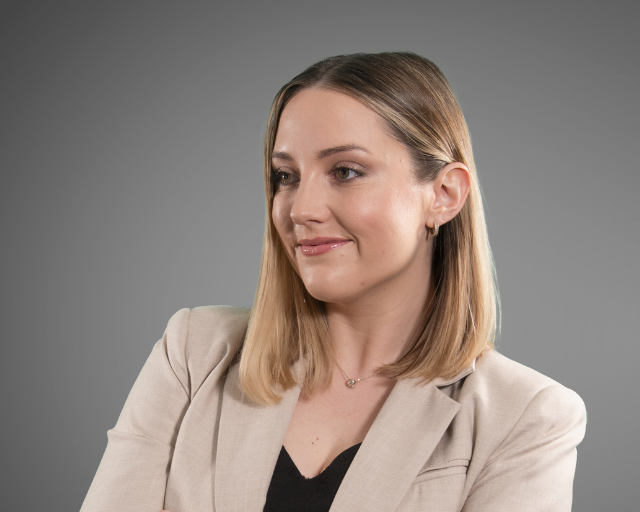
My favourite thing about Practical Legal Training is how real it is. University is very textbook heavy, so finally getting to the point of doing real work was exciting.
Chelsea Donoghue, PLT Graduate

It bridged the gap between being a recent graduate and becoming a confident practitioner. One of the most valuable things I gained from my PLT studies was feeling ready for the workplace.
Michael Tangonan, PLT Graduate

You hear from real practitioners and barristers. Getting feedback on what I was doing well and where I could improve was really helpful.
Anthony El Helou, PLT Graduate
FREQUENTLY ASKED QUESTIONS
Now that you’ve completed (or nearly completed) your law degree, you have a strong theoretical understanding of the law.
But you’re not ready to enter the workforce. Not yet.
PLT equips you with the practical, day-to-day skills you need as an entry-level lawyer. You know, the court-appearing, contract-preparing, law-talking kind.
Think of your PLT as the perfect finishing school. A space to practice your skills and build your confidence as an entry-level lawyer who’s ready to soar.
After completing your PLT, you will be awarded a Graduate Diploma of Legal Practice (GDLP). This means you’ll be eligible to apply for admission as a legal practitioner in your state or territory.
You can start your PLT if you have completed all Priestley 11 core subjects of your law degree – with no more than two electives remaining.
To start your PLT before completing your law degree, you’ll need to seek approval from the admitting authority in your state. Find out more here.
In the Australian Capital Territory, except in rare circumstances, you cannot start your PLT until you’ve completed your degree.
Our full-time course is 15 weeks.
Our part-time course is 30 weeks. (This is a good option if you work full time or have other commitments.)
During your studies, you'll gain an understanding of the theory of law and study key areas known as the 'Priestley 11’:
- Administrative law
- Civil Procedure
- Company Law
- Constitutional Law
- Contracts
- Criminal Law and
- Procedures
- Equity (including Trusts)
- Evidence
- Professional Conduct (including Basic Trust Accounting)
- Property, both Real (including Torrens System Land) and Personal
- Torts
Keep in mind, there may be additional subjects and electives you'll need to complete, based on your university's requirements.
While it's possible, we generally don't recommend it. Full-time study is 30-35 hours per week for 15 weeks with 2-3 tasks due each week.
PLT is your chance to practice skills before entering the workforce, and having enough time for it ensures the best start to your legal career.
The full-time course is fast-paced, and catching up if you fall behind can be challenging.
On the other hand, the part-time course offers a more relaxed pace. It covers the same content over 30 weeks and is perfect for those with work or family commitments.
Keep in mind, you can switch to part-time in the first week if needed.
You can transfer between PLT programs. If you transfer or defer after the census date, a fee will apply.
When enrolling, be realistic about the time you can commit to studying and select a program that offers the pace that best fits your lifestyle.
Part-time: A flexible option that allows you to set your own schedule, committing your 15-17 hours per week to the times that work best for you.
Full-time: For those who are able to commit to full-time study. Full-time immersive courses are 30-35 hours per week.
Yes, you can complete your PLT in any state, no matter where you obtained your law degree.
It's a good idea to consider doing your PLT in the state where you want to practise as a lawyer though, as the coursework is designed to match that specific jurisdiction’s requirements. However, you still have the option to be admitted as a lawyer in any state, except for South Australia and Tasmania, as they have unique requirements.
For South Australia and Tasmania, there are special rules in place. Please reach out to our Customer Engagement Team for more details.
Once you've become a lawyer, you can also seek admission in other Australian states or territories either through the Mutual Recognition Scheme or by applying directly.
Overseas students with an Australian law degree can undertake any of the PLT programs. Our online PLT programs don’t require any on campus attendance. You will only need to participate in live online workshops held between 9am to 5pm, in the local Australian time zone.
You can also complete any of our blended PLT programs. You will need to make sure that your travel documents allow you to study in Australia to attend the five days of onsite workshops.
Once you’ve finished your Practical Legal Training, you’re almost a lawyer—but not quite yet! The next step is applying to the admitting authority to become officially admitted.
To be admitted, you’ll need to:
- Complete a law degree or equivalent.
- Finish your Practical Legal Training.
- Be recognised as a "fit and proper person" by the admitting authority.
In simpler terms, being a "fit and proper person" means they want to make sure you have a good moral character to interpret, argue, and draft the law.
To prove it, you'll have to let them know if you have any criminal, academic or general misconduct history. Make sure you check the specific rules in your state's admissions authority before moving forward.
When you finally get the green light, get ready to attend an admission ceremony where you'll officially become a lawyer. It’s a chance to celebrate with your friends, family, and colleagues – it's a big achievement!
Practical Legal Training and the Graduate Diploma of Legal Practice are essentially the same thing.
When you finish your PLT, you get a Graduate Diploma of Legal Practice qualification. Both are about the training you need after your law degree to become a practising lawyer.
Sometimes people call it by the course name (Practical Legal Training), and other times the qualification you receive (Graduate Diploma of Legal Practice).
So, whether you hear PLT or GDLP, you're on the right track for your legal journey.
There are no lectures, classes, tutorials, or anything like that.
The best way to learn how to be a lawyer, is completing tasks just like the ones you’ll be tackling on the job, and that's what you will spend your time doing.
No, there are no other required attendance dates besides the workshops.
You will complete an online practice ready review at the end of each subject. The review lasts up to 40 minutes, and you can choose a time from a list of available appointments.
Practical Legal Training is not like university, it’s 100% hands-on. The workshops are interactive and require your participation, so they are mandatory.
If you cannot attend a workshop session, you can submit a special consideration request to support@collaw.edu.au.
In some circumstances, it may be possible to attend the workshop later. We cannot guarantee that your special consideration will be approved, and we may recommend that you enrol in a later intake.
There are no traditional written exams here. Our Practical Legal Training (PLT) is all about being hands-on and practical.
After workshops, you'll jump into our interactive Learning Portal where you’ll tackle tasks that feel like real-world scenarios.
To make sure you feel ready to take on the challenges of a legal workplace, you’ll complete a “practice ready review” for each subject. But they’re not your typical test.
Picture a conversation with an evaluator (who is a lawyer), stepping into the shoes of your supervisor. You’ll review the tasks you've completed for a subject and discuss how and why you’ve settled on your conclusions – just like how real matters operate with your supervisor at work.
The practice ready review is all about boosting your confidence, ensuring you're ready to take on the challenges of a legal workplace.
You can start your work experience up to 2 years before beginning your PLT.
You will need to complete at least 15 days work experience in Australia after starting the PLT program and accrued at a minimum rate of 2 days per week.
You can undertake the remainder of your work experience before, during or after you begin the PLT program.
You can accrue up to 60 days work experience in the two years prior to starting your Practical Legal Training.
To be eligible, your work experience must comply with the Work Experience Rules. In short, your work experience:
- Must occur in the delivery of legal services
- Must be under the supervision of an appropriate supervisor
- May be undertaken in one or multiple placements
- May include experience undertaken as an undergraduate (but such experience cannot be used to satisfy the entire placement).
To count towards your PLT, your work experience must:
- Occur in the delivery of legal services
- Be under the supervision of an appropriate supervisor
- Comply with the work experience rules
You can find out if your work experience can count towards your PLT by submitting an Application for Approval Form to support@collaw.edu.au
This form can be submitted before you enrol at the College of Law, and we’ll keep a record of your work experience.
Work experience undertaken before you begin your PLT program can count towards some, but not all, of your PLT work experience.
All students need to complete 15 days’ work experience after beginning their PLT program.
If you’re completing the 75-days work experience option, the remaining 60 days work experience can be undertaken in the 2 years prior to starting your PLT program.
A person can be your work experience supervisor if they are an Australian legal practitioner and are currently practising and:
- hold a full practising certificate as a legal practitioner;
- hold a restricted practising certificate as a legal practitioner which they have held for 2 years;
- are a judge;
- are a tribunal member who is a legal practitioner; or
- are a person who does not hold a practising certificate but is eligible to do so and who provides acceptable written submission to satisfy the Committee they can provide appropriate practical experience.
Information about the role of supervisors can be found in the Work Experience Guide for Supervisors
Getting your work experience approved is a straightforward process that involves six simple steps.
You don't even need to be a College student to have your work experience recorded for future use in your PLT journey.
Here are the five steps to follow:
- Carefully read through the Work Experience Rules
- Share the Work Experience Guide for Supervisors (Western Australia version if needed) with your supervisor so they understand the requirements
- Email your completed Work Experience Approval Form before or shortly after you begin your placement
- We'll review your application and inform you of the outcome
- Once you finish your placement, email the Work Experience Declaration Form, signed by your supervisor, to the College
You can find all the forms you need below:
Guide for Students
Guide for Supervisors (WA version)
Work Experience Rules
Application for Approval Form
Declaration Form
Remote Supervision Diary
Journal
Clinical Experience Module Enrolment Form
Just click the links to access what you need!
The College of Law does not guarantee work experience placements for students.
If you enrol in the College’s PLT program, you will have access to one-on-one career consultations with a Careers Advisor for guidance on finding work and planning your career.
You can also visit the College of Law's Jobs Board to view and apply for opportunities for law graduates.
Yes. If you are completing work experience remotely, you will need to complete the Work Experience Remote Supervision Diary.
Your work experience must still comply with the Work Experience Rules.
College students on unpaid approved work experience placements are insured for personal injury and civil liability.
You can request a copy of our Certificates from support@collaw.edu.au
Nope, you don't need your exam results to enrol. Here's when you'll need to provide them:
In the ACT, VIC and WA, you have until the enrolment close date (one week before the course begins).
In NSW, NT and SA, you'll need to provide them by the program census date.
In Queensland, you have until the end of the program to provide your exam results.
You can enrol in the course up until the Monday before it starts, which is one week before the course begins.
After you submit, you'll get an email acknowledgment. If we need more information, we'll contact you.
Expect your enrolment confirmation in 5-10 business days.
International students studying outside of Australia are not required to have a USI.
To complete the enrolment form, simply:
- Enter an overseas address
- Select ‘Studying Outside of Australia’ in the ‘Citizenship’ section
- Leave the USI field blank
You can pay by:
- Credit card (Visa, MasterCard, or Amex)
- Direct deposit into The College of Law's account
Keep in mind, non-FEE-HELP students must pay the full fee when enrolling. If you use FEE-HELP, no upfront payment is needed, and you can split payments between FEE-HELP, self-funding, or employer contributions
Yes. FEE-HELP (a student loan provided by the Federal Government) is available for eligible students. You can use FEE-HELP to pay all or part of your tuition fees.
To become a lawyer in Australia with an overseas law degree, you'll need to have your qualifications evaluated by the admitting authority in the specific state or territory where you want to practice.
Depending on their assessment, you may have to complete the entire PLT program or just specific subjects within it. We provide individual PLT subjects for students who are required by the admitting authorities to take certain PLT subjects while being exempt from others.
Yes, we offer single PLT subjects for overseas solicitors and others who are required by an admitting authority to complete some subjects of the PLT program.
You will need to have your law qualifications assessed by the admitting authority in the state or territory you wish to practice in before enrolling in the subjects.
Yes, if your law degree is from a country where English isn’t the main language, you’ll need to prove your English proficiency.
The required IELTS standard is at level 8 (writing), 7.5 (speaking), 7.0 (reading) 7.0 (listening) and 7.5 overall.
You’ll need to submit a certificate showing you’ve met these standards.
If you’ve finished an Australian law degree and you’re an international student, we’re here to help. We can assist you in applying for an 11-month visa to complete your PLT.
You’ll need to enroll in our CRICOS-approved, full-time, on-campus PLT program at the Sydney CBD campus (CRICOS course code 069734C). We’ll also provide you with an electronic Confirmation of Enrolment (eCOE) to get your student visa.
Absolutely! In some states, you can choose to do your Practical Legal Training completely online, including in the states and territories where it is available.
Just remember, our online courses include 5 days of on-campus attendance in Australia. Make sure your travel documents are ready so you can join us for these onsite sessions.
- ACT: Legal Practitioners Admission Board
- NSW: Legal Profession Admission Board
- NT: Legal Practitioners Admission Board
- QLD: Queensland Legal Practitioners Admissions Board
- SA: Legal Practitioners Education and Admission Council
- TAS: Board of Legal Education
- VIC: Victorian Legal Admissions Board
- WA: Legal Practice Board
Sydney is a major international city and the College campus is located in the centre of the CBD. The cost of living is high by Australian standards but lower than other major international cities such as London, New York or Tokyo.
There are many accommodation options but, once again, the price of accommodation tends to be high by Australian standards. Some examples of accommodation suitable for students can be found here.
There are a great many options for recreational and social activities in Sydney and surrounding regions. Sydney is famous for its sporting stadiums, theatrical and cultural activities, bars and restaurants, bush and beaches, and features the most beautiful harbour in the world.
Studying in a foreign city is exciting but comes with special challenges, especially if you do not have friends or family already here.
Any questions regarding your enrolment or learning at the College should be directed to your lecturer. For other issues, the College has a Student Liaison Officer able to help with basic questions. Possible issues may include:
- English language problems: you are required to have good English skills to enrol in the course but if you are struggling to understand the College may be able to help by delaying your Coursework while you take a refresher course in English.
- Legal problems: the College is not able to provide legal advice but may be able to assist with finding you an appropriate legal service.
- Employment rights: you are entitled to work in paid employment for up to 20 hours per week across the duration of your student visa. You are also entitled to work an additional 35 hours per week (for a maximum of 15 weeks) in satisfaction of your Work Experience Component.
The College is not able to advise you if you are having problems in the workplace but will help you to find an appropriate legal service should that be required.
You can also contact the Commonwealth Ombudsman if you wish to make a complaint regarding your experience at the College.
If you need to extend or obtain your student visa through the College of Law, you are required to complete our on-campus program in the Sydney CBD, NSW (CRICOS course code 069734C).
During the program you will attend campus on Monday to Friday 9 to 5pm for the first week and Monday to Wednesday 9.00am to 3.30pm for the remainder of the 15-week program.
When you apply for the on-campus program, we can provide you with an eCOE, which will allow you to apply for an an 11-month student visa.
To keep your student visa, you’ll need to follow some rules, including attendance, progress, transfers, and assessments. It’s important to attend all your classes and meet the College’s academic standards. If these requirements aren’t met, your visa could be shortened or even cancelled.
JOIN OUR NEWSLETTER
Sign up to keep up to date with latest news, programs, events and career tips.


